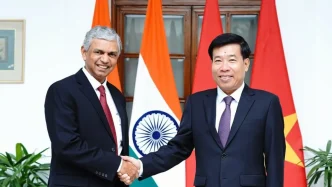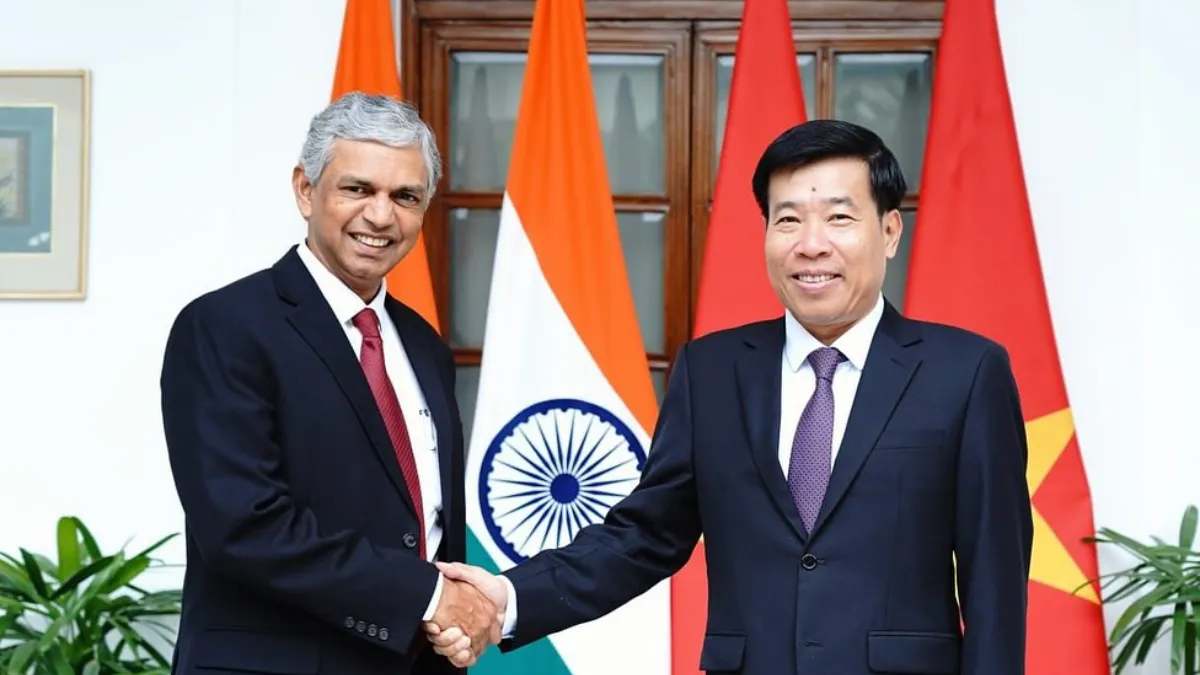In a significant step toward deepening bilateral relations, Vietnam and India have reaffirmed their commitment to a Comprehensive Strategic Partnership during high-level talks in New Delhi. On June 25, Vietnamese Deputy Minister of Foreign Affairs Nguyen Manh Cuong and his Indian counterpart Periasamy Kumaran co-chaired the 13th Political Consultation and the 10th Strategic Dialogue, setting the stage for enhanced cooperation across political, economic, and security domains as the two nations approach the 10th anniversary of their partnership in 2026.
Building on Political Trust
The discussions in New Delhi highlighted the robust political trust that underpins Vietnam-India relations. Both sides reviewed progress since high-level engagements, including Vietnamese Prime Minister Pham Minh Chinh’s state visit to India in August 2024, and agreed that agreements from such visits are being implemented effectively. The dialogue underscored a shared commitment to strengthening ties across all levels, including through Party channels, with regular exchanges between Vietnam’s Communist Party and India’s ruling Bharatiya Janata Party (BJP) seen as a cornerstone for stability and deeper collaboration.
Preparations for significant high-level visits in 2025 were a key focus, with both officials aiming to mark a new phase in their relationship. This comes as Vietnam and India prepare to celebrate a decade of their Comprehensive Strategic Partnership, established in 2016. The emphasis on political dialogue reflects a mutual desire to maintain momentum and address shared regional and global challenges through coordinated efforts.
Defence and Security as Strategic Pillars
Defence and security emerged as central themes of the dialogue, with both sides describing these areas as critical pillars of their partnership. Cuong and Kumaran stressed the importance of expanding cooperation in training, technology sharing, and defence industry collaboration. This aligns with broader regional security concerns, including maritime security in the Indo-Pacific, where both nations have vested interests in maintaining stability and freedom of navigation.
The emphasis on security cooperation also extended to addressing transnational challenges such as terrorism, cybercrime, and high-tech crime. Both officials agreed to enhance coordination to tackle these issues, recognizing the evolving nature of threats in an increasingly interconnected world. While specific details of planned initiatives remain undisclosed, the commitment to joint action signals a proactive approach to safeguarding mutual interests.
Economic Ties: Untapped Potential
Economic collaboration was another focal point, with two-way trade between Vietnam and India reaching nearly US$15 billion in 2024. Despite this growth, both sides acknowledged that the figure falls short of their full potential. They pledged to adopt innovative measures to boost trade in a balanced and mutually beneficial manner, aiming to mitigate the impact of global trade fluctuations and contribute to a stable supply chain in the region.
Investment also featured prominently, with growing interest from businesses in both countries in sectors such as strategic infrastructure, energy, renewable energy, and emerging technologies like artificial intelligence (AI) and semiconductors. Cuong highlighted Vietnam’s ongoing strategic breakthroughs in science, technology, and private sector development, expressing hope for closer ties with India in these areas. The establishment of joint research funds was proposed to foster technological self-reliance, a priority for both nations amid global competition in innovation.
Emerging Technologies and Green Transition
The dialogue also explored opportunities in cutting-edge fields such as AI, rare earths, and information technology (IT). For Vietnam, collaboration in these areas aligns with its ambition to modernize and diversify its economy, while India sees potential in leveraging its technological expertise to support mutual growth. The focus on green transition and renewable energy reflects a shared recognition of the need to address climate challenges, with both countries positioned to play significant roles in sustainable development within the region.
While specific projects or timelines were not disclosed, the intent to deepen ties in these strategic sectors could position Vietnam and India as key partners in shaping the future of technology and environmental policy in Asia. If successful, such initiatives may serve as a model for other bilateral partnerships in the region, though their impact will depend on effective implementation and resource allocation.
Cultural and People-to-People Connections
Beyond politics and economics, the talks emphasized the deep cultural and religious ties that have historically bound Vietnam and India. Both sides viewed these connections as a foundation for enhancing people-to-people exchanges, as well as cooperation in tourism, culture, and education. Cuong expressed gratitude for India’s continued support in training, scholarships, and community development through initiatives like the “Quick Impact Projects” (QIPs), which have benefited Vietnamese localities.
These cultural linkages, rooted in shared historical influences such as Buddhism, provide a unique dimension to the relationship. Strengthening these ties could foster greater mutual understanding and goodwill, particularly as both nations seek to expand tourism and educational exchanges. The potential for cultural diplomacy to complement strategic and economic goals remains significant, offering a softer yet equally impactful avenue for collaboration.
Regional and Global Coordination
On the international stage, Vietnam and India reaffirmed their commitment to cooperation within multilateral forums, advocating for a rules-based regional and international order. They shared perspectives on current security challenges and the broader geopolitical landscape, agreeing to support dialogue and enhance the role of institutions like the Association of Southeast Asian Nations (ASEAN). India reiterated its backing of ASEAN’s central role and its Act East Policy, with Vietnam positioned as a key partner in this framework.
The dialogue also addressed collaboration with the Mekong sub-region, where India seeks to deepen engagement across various sectors. This aligns with Vietnam’s role as a bridge between ASEAN and other regional actors, potentially amplifying its influence in shaping sub-regional dynamics. Both sides expressed a desire to support each other’s initiatives, reflecting a broader vision of collective progress and stability in Asia.
High-Level Engagements and Future Outlook
As part of his visit, Cuong paid a courtesy call on Indian Minister of External Affairs S. Jaishankar, underscoring Vietnam’s prioritization of its relationship with India. He affirmed Vietnam’s intent to work closely with Indian ministries and agencies to advance cooperation in defence, trade, science, culture, and people-to-people exchanges. Jaishankar, in turn, called for greater focus on trade, investment, energy, and connectivity, expressing hope for a swift review of the ASEAN-India Trade in Goods Agreement (AITIGA). Both agreed to hold the 19th session of the Vietnam-India Joint Commission on Bilateral Cooperation at the foreign ministerial level in 2025.
Cuong’s itinerary also included meetings with other Indian officials, such as Deputy National Security Advisor Pavan Kapoor and Deputy Minister of Commerce and Industry Rajesh Agrawal, as well as discussions with representatives of the India-Vietnam Chamber of Commerce and Industry (IVCCI) in Mumbai. These engagements aimed to bolster economic ties between Vietnamese localities and Mumbai, a major financial hub, further diversifying the scope of bilateral relations.
A Partnership Poised for Growth
The outcomes of the New Delhi dialogue signal a maturing partnership between Vietnam and India, one that spans strategic, economic, and cultural dimensions. As both nations navigate a complex regional and global environment, their commitment to mutual support and collaboration could yield significant benefits, from enhanced security to economic resilience. Yet, the success of these ambitions will hinge on translating high-level agreements into tangible results, a challenge that both sides appear ready to address.
As the 10th anniversary of their Comprehensive Strategic Partnership approaches, questions remain about how Vietnam and India will balance their bilateral priorities with broader regional dynamics. With planned high-level visits in 2025 and a shared vision for innovation and stability, the coming years could mark a transformative chapter in their relationship, with ripple effects across Southeast Asia and beyond.
















